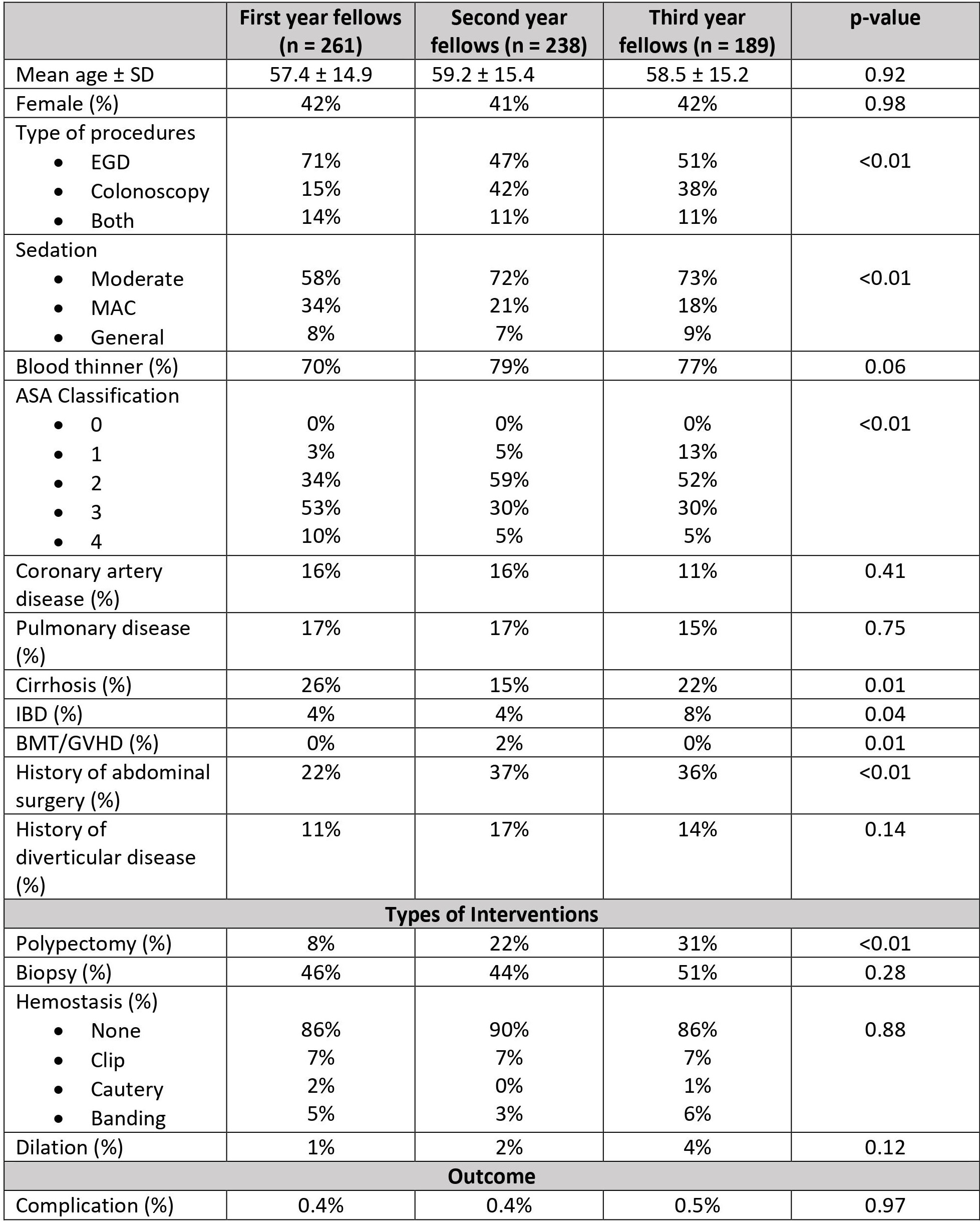Back


Poster Session C - Monday Afternoon
Category: General Endoscopy
C0294 - Complication Rates for Esophagogastroduodenoscopy and Colonoscopy Procedures Performed by GI Trainees at a Tertiary Care Center
Monday, October 24, 2022
3:00 PM – 5:00 PM ET
Location: Crown Ballroom

Has Audio
- JD
Jesus Dominguez, MD
University of California San Diego
La Jolla, CA
Presenting Author(s)
Jesus Dominguez, MD, Parnia Choubdar, , Mei Yang, , Ziqiang Cao, , Sinda Hidri, , Hiwon Lee, , Denise Kalmaz, MD
University of California San Diego, La Jolla, CA
Introduction: There are well-established quality indicators for esophagogastroduodenoscopy (EGD) and colonoscopy which include post-procedure complication rates for perforation, bleeding, infection and cardiopulmonary events. Despite knowledge of complication rates for practicing gastroenterologists, there is limited data regarding complication rates for procedures performed by GI trainees. We report the results of our tertiary care hospital experience with the rate of complications for endoscopic procedures performed by GI trainees.
Methods: We performed a retrospective chart review of 772 procedures performed by GI trainees over a three year period from 2018 to 2021. Data was collected for total of 478 EGDs and 294 colonoscopies including level of trainee, type of anesthesia/sedation, procedure indication, inpatient versus outpatient status, ASA classification, and significant co-morbidities including coronary artery disease, pulmonary disease, inflammatory bowel disease and cirrhosis. Specific endoscopic interventions were also reviewed including biopsy, polypectomy, hemostasis, banding and dilation. Charts were reviewed for any complication occurring within 14 days after each procedure.
Results: Out of 772 procedures, a total of three complications occurred. All complications were in patients undergoing EGD (6.2 per 1000 EGDs). One complication was post-variceal banding ulcer bleeding event in a patient with cirrhosis. Two complications were aspiration events, one in setting of moderate sedation and one with anesthesia. Both aspiration events were in high-risk patients – one with vomiting and the other with food impaction. All complications were evenly distributed among level of training leading to a complication rate of 0.4%, 0.4% and 0.5% for first year, second year and third year fellows respectively (p 0.97). There were no complications for the 294 colonoscopies performed. The majority of procedures were performed as inpatient status and over 80% of the patient population was ASA 2 and 3 classification.
Discussion: GI trainee involvement in EGD and colonoscopy procedures does not confer high risk of complication despite a majority of patients being inpatient status and with significant co-morbidities. More research is needed to elicit information regarding complication rates for procedures performed by GI trainees.

Disclosures:
Jesus Dominguez, MD, Parnia Choubdar, , Mei Yang, , Ziqiang Cao, , Sinda Hidri, , Hiwon Lee, , Denise Kalmaz, MD. C0294 - Complication Rates for Esophagogastroduodenoscopy and Colonoscopy Procedures Performed by GI Trainees at a Tertiary Care Center, ACG 2022 Annual Scientific Meeting Abstracts. Charlotte, NC: American College of Gastroenterology.
University of California San Diego, La Jolla, CA
Introduction: There are well-established quality indicators for esophagogastroduodenoscopy (EGD) and colonoscopy which include post-procedure complication rates for perforation, bleeding, infection and cardiopulmonary events. Despite knowledge of complication rates for practicing gastroenterologists, there is limited data regarding complication rates for procedures performed by GI trainees. We report the results of our tertiary care hospital experience with the rate of complications for endoscopic procedures performed by GI trainees.
Methods: We performed a retrospective chart review of 772 procedures performed by GI trainees over a three year period from 2018 to 2021. Data was collected for total of 478 EGDs and 294 colonoscopies including level of trainee, type of anesthesia/sedation, procedure indication, inpatient versus outpatient status, ASA classification, and significant co-morbidities including coronary artery disease, pulmonary disease, inflammatory bowel disease and cirrhosis. Specific endoscopic interventions were also reviewed including biopsy, polypectomy, hemostasis, banding and dilation. Charts were reviewed for any complication occurring within 14 days after each procedure.
Results: Out of 772 procedures, a total of three complications occurred. All complications were in patients undergoing EGD (6.2 per 1000 EGDs). One complication was post-variceal banding ulcer bleeding event in a patient with cirrhosis. Two complications were aspiration events, one in setting of moderate sedation and one with anesthesia. Both aspiration events were in high-risk patients – one with vomiting and the other with food impaction. All complications were evenly distributed among level of training leading to a complication rate of 0.4%, 0.4% and 0.5% for first year, second year and third year fellows respectively (p 0.97). There were no complications for the 294 colonoscopies performed. The majority of procedures were performed as inpatient status and over 80% of the patient population was ASA 2 and 3 classification.
Discussion: GI trainee involvement in EGD and colonoscopy procedures does not confer high risk of complication despite a majority of patients being inpatient status and with significant co-morbidities. More research is needed to elicit information regarding complication rates for procedures performed by GI trainees.

Figure: Results
Disclosures:
Jesus Dominguez indicated no relevant financial relationships.
Parnia Choubdar indicated no relevant financial relationships.
Mei Yang indicated no relevant financial relationships.
Ziqiang Cao indicated no relevant financial relationships.
Sinda Hidri indicated no relevant financial relationships.
Hiwon Lee indicated no relevant financial relationships.
Denise Kalmaz indicated no relevant financial relationships.
Jesus Dominguez, MD, Parnia Choubdar, , Mei Yang, , Ziqiang Cao, , Sinda Hidri, , Hiwon Lee, , Denise Kalmaz, MD. C0294 - Complication Rates for Esophagogastroduodenoscopy and Colonoscopy Procedures Performed by GI Trainees at a Tertiary Care Center, ACG 2022 Annual Scientific Meeting Abstracts. Charlotte, NC: American College of Gastroenterology.
